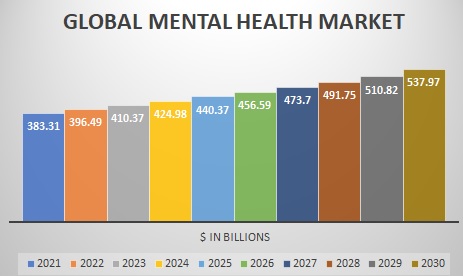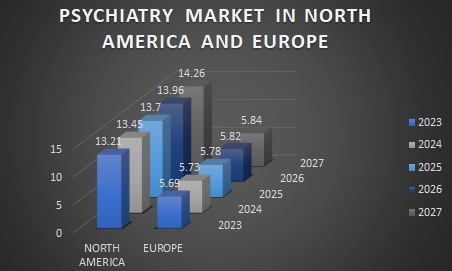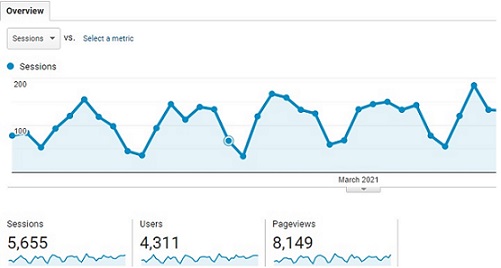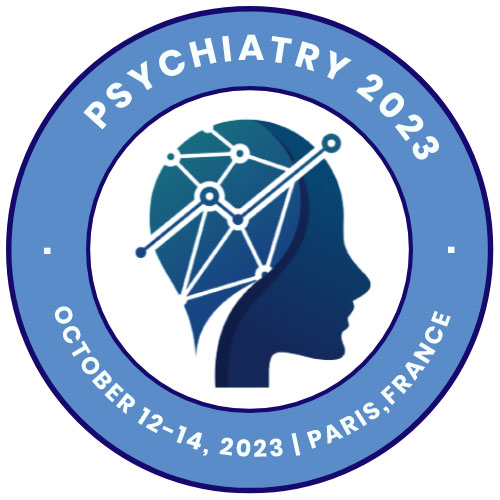Renowned Speakers
We’ve invited the top most influential speakers from around the world to give inspirational talks and lead practical workshops.
Conference Information
Welcome Message
After the tremendous success of our previous conference, on behalf of Organizing Committee we are delighted to welcome you back to the 4th Global Experts Meeting on Psychiatry and Mental Health scheduled in the stunning city of Paris, France on October 12-14, 2023.
We're thrilled to have such an esteemed group of professionals and experts gathered together to discuss the latest trends and innovations in Mental Health and Psychiatry.
The conference will focus on Reintegrating Psychological Innovations to Improve Mental Health in psychiatry emphasizing the importance of staying updated with the latest trends, techniques, and insights.
There's a diverse range of topics that will be covered at Psychiatry 2023. The discussions will include innovative scientific breakthroughs and the latest advancements in psychiatry and mental health. Along with keynote speeches, oral presentations, posters, seminars, and exhibitions, the conference will also feature engaging workshops and interactive sessions.
Psychiatry 2023 provides ample opportunities to network with fellow attendees, share your expertise, and gain new insights that can enhance your professional development. We're confident that you'll find this conference both informative and engaging.
Also don’t miss to check out the amazing city we're hosting this conference in as well! It is our team's goal to ensure that you have a great conference experience both inside and outside the conference.
We are excited and anticipating the opportunity to meet and network with you at the conference. Once again, welcome to Psychiatry 2023 in Paris, France.
Regards,
Organizing Committee
Psychiatry 2023
About Psychiatry 2023
We are delighted to invite you to the 4th Global Experts Meeting on Psychiatry and Mental Health conference held on October 12-14, 2023 in Paris, France.
The theme of Psychiatry conference is Reintegrating Psychological Innovations to Improve Mental Health.
Psychiatry 2023 seeks to inspire participants with their insights and engage them in engaging debates that will challenge preconceptions and extend perspectives by bringing together the most important speakers and prominent experts in the area.
The objective of our conference is for people in the Mental Health and Psychiatry areas to discuss topics and learn from the best.
Why this conference:
- Focused on a specific area of psychiatry and mental health.
- Stay up-to-date with industry experts.
- Build your network with like-minded professionals.
- Showcase your expertise through presentations.
- Stay current with industry trends.
- Career Advancement.
- Access to valuable resources.
- Meet international colleagues and experts.
- Opportunities for collaboration.
- Professional development.
- Gain inspiration.
Objectives of Psychiatry 2023:
- To provide psychiatrists, mental health professionals, and other attendees with up-to-date information on the latest research, trends, and treatments in the field of psychiatry.
- To facilitate networking opportunities for attendees to connect with their peers, colleagues, and experts in the field of psychiatry.
- To encourage collaboration and cooperation between different professionals in the field of psychiatry, including psychiatrists, psychologists, social workers, and other mental health professionals.
- To raise awareness and advocate for issues related to mental health, including access to care, stigma reduction, and policy changes.
- To showcase innovative approaches and technologies in the field of psychiatry , including new treatments, diagnostic tools, and therapeutic techniques.
Benefits of Attending:
- Best Poster Award nominations.
- Outstanding Young Researcher Award.
- Group Registration perks.
- Keynote presentations by the world's most distinguished researchers.
- Top Industries Representation.
Target Audience:
- Psychiatrist
- Psychologist
- Psychiatric nurse
- Psychotherapists
- Mental health professional
- Graduates, Post Graduates & Ph.D. Scholars
- Professors
- Students
- Therapist
- Researchers
- Business Entrepreneurs
- Non-profit organization
Abstract Submission
Psychiatry 2023 welcomes you to submit your abstracts.
Abstracts can be submitted to any scientific session of the conference, and the International Organizing Committee will review Oral and Poster presentations based on accepted submissions. Following a peer review procedure, you will be notified via email of the acknowledgement of your abstract within 3-5 business days.
Summit your abstracts in the following sessions:
- Psychiatry
- Mental Health
- Telepsychiatry
- Forensic Psychiatry
- Treatments in psychiatry
- Psychotherapy
- Child And Adolescent Psychiatry
- Anxiety And Stress Disorders
- Psychotic Disorders
- Geriatric Psychiatry
- Suicide Prevention
- Virtual Reality Therapy
- Psychopharmacology
- Psychiatric Rehabilitation
- Pediatric Psychiatry
- Digital Therapeutics
- Cultural Psychiatry
- Addiction Psychiatry
- Neurosurgery
- Brain Disorder
- Epigenetics in Psychiatry
- Neurodevelopmental Disorders
- Trauma and Stroke
- Sleep Disorders
- Mental wellbeing
- Sports Psychiatry
- Psychology
Scientific Sessions
Psychiatry is a medical specialty that focuses on the diagnosis, treatment, and prevention of mental illness and emotional disorders. In addition to treating mental illness, psychiatry also involves research into the causes and underlying mechanisms of mental disorders. This session addresses the latest advancements and research findings in the field of Psychiatry.
- Precision medicine
- Brain imaging
- Integrated care
- Neurodevelopmental Disorders.
Related Associations: American Association of Suicidology | National Eating Disorders Association (NEDA) | National Council for Behavioral Health (NCBH) | National Association of Social Workers (NASW) | American Psychological Association | European Academy of Occupational Health Psychology | British Association for Behavioural and Cognitive Psychotherapies | Finnish Psychological Association | American Psychiatric Association (APA)
Good mental health is essential for personal well-being and community functioning. Mental health cannot exist in isolation from physical health, and social and psychological functioning is interdependent. Mental health and mental illness are influenced by a complex interplay of social, psychological, and biological factors, similar to general health and illness. Positive mental health can be understood as positive emotions, personality traits. This session aims to promote Mental Health and strategies to cope with challenges.
- Gender and Mental Health
- Psychiatric Social Work
- Caring for Mental Illness
- Behavioral Health Guidelines
Related Associations: Mental Health America (MHA) | National Association of Psychiatric Health Systems (NAPHS) | Psychiatric Nurses Association (PNA) | European Psychiatric Association (EPA) | European Society for Child and Adolescent Psychiatry (ESCAP) | European Association of Social Psychology (EASP) | European Association for Psychotherapy and Counselling (EAPC) | European Federation of Psychologists Associations (EFPA) | European Association of Substance Abuse Research (EASAR)
Telepsychiatry is a form of psychiatry that utilizes telecommunication technology, such as video conferencing, to provide mental health care services remotely. Telepsychiatry has become increasingly popular in recent years, especially during the COVID-19 pandemic, as it allows patients to receive mental health care from the comfort and safety of their own homes. This session addresses the advancements and challenges in telepsychiatry, including virtual platforms, integration into traditional settings, and benefits/drawbacks.
- Telemedicine
- Mental health care
- Technology in healthcare
- Ethical and legal considerations
- Developments in Telepsychiatry
Related Associations: American Academy of Child and Adolescent Psychiatry (AACAP) | National Alliance on Mental Illness (NAMI) | American Psychological Association (APA) | World Psychiatric Association (WPA) | National Institute of Mental Health (NIMH) | Bangladesh Association of Psychiatrists | Indonesian Psychiatric Association | Anxiety and Depression Association of America (ADAA) | American Society of Addiction Medicine (ASAM)
Forensic psychiatry is a field of psychiatry that specializes in the intersection of law, mental health assessment, and treatment of individuals with mental disorders who have committed offenses. It provides support and assistance to courts and related agencies, including mentally disordered offenders in prisons, secure hospitals, and communities. Forensic psychiatry is also concerned with the ethical considerations of psychiatry, making predictions about an individual's mental state and the severity of their actions, and the contribution of psychiatry to criminology and penology. This session will focus on current research and trends in the field of forensic psychiatry.
- Medication-Assisted Treatment (MAT)
- Dialectical Behavior Therapy (DBT),
- Schema-Focused Therapy.
Related Associations: American Association of Suicidology | National Eating Disorders Association (NEDA) | National Council for Behavioral Health (NCBH) | National Association of Social Workers (NASW) | American Psychological Association | European Academy of Occupational Health Psychology | British Association for Behavioural and Cognitive Psychotherapies | Finnish Psychological Association | American Psychiatric Association (APA)
Psychiatric therapies cover a wide range of methods and tactics used by mental health professionals to manage and treat mental illnesses. Treatment for mental illnesses should reduce symptoms, improve functioning and quality of life, and promote overall mental health. The latest developments and innovations in psychiatric treatments encompass both conventional methods and emerging technologies. The session covers challenges and opportunities of implementing new treatments in clinical practice, along with ethical considerations when using novel technologies in mental healthcare.
- Electroconvulsive therapy (ECT)
- Transcranial magnetic stimulation (TMS)
Related Associations: Mental Health America (MHA) | National Association of Psychiatric Health Systems (NAPHS) | Psychiatric Nurses Association (PNA) | European Psychiatric Association (EPA) | European Society for Child and Adolescent Psychiatry (ESCAP) | European Association of Social Psychology (EASP) | European Association for Psychotherapy and Counselling (EAPC) | European Federation of Psychologists Associations (EFPA) | European Association of Substance Abuse Research (EASAR)
Psychotherapy is considered an effective treatment option for a variety of mental health conditions. Numerous studies have demonstrated that psychotherapy can be as effective as medication, and sometimes even more effective over the long term. It can be particularly effective when it is personalized to the individual needs and characteristics of the patient. In this session, the integration of new technologies into therapy, and emerging approaches to treating various mental health conditions are addressed.
- Personalizing Treatment
- Psychodynamic Therapy
- Humanistic Therapy
Related Associations: American Academy of Child and Adolescent Psychiatry (AACAP) | National Alliance on Mental Illness (NAMI) | American Psychological Association (APA) | World Psychiatric Association (WPA) | National Institute of Mental Health (NIMH) | Bangladesh Association of Psychiatrists | Indonesian Psychiatric Association | Anxiety and Depression Association of America (ADAA) | American Society of Addiction Medicine (ASAM)
Child and Adolescent Psychiatry
Child and adolescent psychiatry play a vital role in the prevention of mental health disorders in young people. This can include interventions aimed at reducing risk factors, such as family or school-based interventions, as well as efforts to promote protective factors, such as supportive social relationships and positive coping skills. The most common childhood mental disorders are anxiety disorders, depression, and attention deficit hyperactivity disorder (ADHD). This session will showcase the risk factors that contribute to the development of mental health disorders affecting children and adolescents.
- Child abuse and negligence
- Emotional and Behavioral diseases
- Social impact
- Attention- deficiency
- Aggression and violence
Related Associations: American Association of Suicidology | National Eating Disorders Association (NEDA) | National Council for Behavioral Health (NCBH) | National Association of Social Workers (NASW) | American Psychological Association | European Academy of Occupational Health Psychology | British Association for Behavioural and Cognitive Psychotherapies | Finnish Psychological Association | American Psychiatric Association (APA)
Stress and anxiety are natural responses to challenges and threats, but chronic or excessive levels of these can have negative effects on our health. Depression, anxiety disorders. This session will emphasize the significance of identifying the signs and symptoms of chronic stress and anxiety and provide effective strategies for managing and reducing these conditions.
- Anxiety disorders
- Post-traumatic stress disorder (PTSD)
- Agoraphobia
Related Associations: Mental Health America (MHA) | National Association of Psychiatric Health Systems (NAPHS) | Psychiatric Nurses Association (PNA) | European Psychiatric Association (EPA) | European Society for Child and Adolescent Psychiatry (ESCAP) | European Association of Social Psychology (EASP) | European Association for Psychotherapy and Counselling (EAPC) | European Federation of Psychologists Associations (EFPA) | European Association of Substance Abuse Research (EASAR)
Psychotic disorders are severe mental illnesses that hinder an individual's capacity to think clearly, handle emotions, and discern reality. These disorders can have a significant impact on an individual's life and their family and friends Advancements in research have contributed to a better understanding of psychotic disorders and the development of new treatment approaches. With proper care, individuals with these disorders can manage their symptoms and lead fulfilling lives. This session addresses the latest research and clinical developments in the diagnosis, treatment, and management of psychotic disorders
- Schizoaffective disorder
- Delusional disorder
- Brief psychotic disorder
- Schizophrenia
Related Associations: American Academy of Child and Adolescent Psychiatry (AACAP) | National Alliance on Mental Illness (NAMI) | American Psychological Association (APA) | World Psychiatric Association (WPA) | National Institute of Mental Health (NIMH) | Bangladesh Association of Psychiatrists | Indonesian Psychiatric Association | Anxiety and Depression Association of America (ADAA) | American Society of Addiction Medicine (ASAM)
Geriatric psychiatry is a specialized field that addresses the unique mental health needs of older adults, taking into account age-related changes, complex assessment and diagnosis, and individualized treatment approaches. The session will look at the most recent research and innovations in geriatric psychiatry, with a focus on enhancing outcomes and quality of life for older adults.
- Cognitive and Behavioral Psychology
- Personality disorders
- Neurocognitive disorders
Related Associations: American Association of Suicidology | National Eating Disorders Association (NEDA) | National Council for Behavioral Health (NCBH) | National Association of Social Workers (NASW) | American Psychological Association | European Academy of Occupational Health Psychology | British Association for Behavioural and Cognitive Psychotherapies | Finnish Psychological Association | American Psychiatric Association (APA)
Suicide is a serious and complex issue resulting from a combination of factors including mental health, isolation, financial difficulties, relationship problems, and substance abuse. Suicide prevention involves a range of efforts aimed at reducing the risk of suicide at the individual, relational, community, and societal levels. While suicide is often preventable, strategies to prevent it extend beyond direct interventions to include:
- Providing treatment for mental illness
- Enhancing coping mechanisms for individuals at risk
- Reducing risk factors associated with suicide,
- Instilling hope for a better future by offering support and resources
Related Associations: Mental Health America (MHA) | National Association of Psychiatric Health Systems (NAPHS) | Psychiatric Nurses Association (PNA) | European Psychiatric Association (EPA) | European Society for Child and Adolescent Psychiatry (ESCAP) | European Association of Social Psychology (EASP) | European Association for Psychotherapy and Counselling (EAPC) | European Federation of Psychologists Associations (EFPA) | European Association of Substance Abuse Research (EASAR)
Virtual reality therapy has shown promising results in the field of psychiatry and mental health. This type of therapy involves using a virtual environment to simulate situations that people may encounter in real life and providing them with a safe and controlled space to practice coping strategies and Behavioral changes. In this session, the experts will discuss the benefits of virtual reality therapy over traditional therapeutic approaches and as well as
- Technological advancements
- Exposure therapy
- Medical Training
- Pain Management
Related Associations: American Academy of Child and Adolescent Psychiatry (AACAP) | National Alliance on Mental Illness (NAMI) | American Psychological Association (APA) | World Psychiatric Association (WPA) | National Institute of Mental Health (NIMH) | Bangladesh Association of Psychiatrists | Indonesian Psychiatric Association | Anxiety and Depression Association of America (ADAA) | American Society of Addiction Medicine (ASAM)
Psychopharmacology is an ongoing and crucial aspect of treating mental health disorders and advancing our comprehension of the brain and behavior. The field involves examining how drugs impact psychological processes and behavior, including delving into the mechanisms of action of drugs, their pharmacokinetics, and potential side effects. These subtopics explore the mechanisms of action of drugs, their effects on the brain and behavior, and the potential benefits and risks of different treatments. This session discusses about the emerging therapies and future directions in psychopharmacology research.
- Pharmacokinetics
- Neurotransmitters and receptors
- Drug development and clinical trials
- Side effects and adverse reactions
- Non-pharmacological interventions.
Related Associations: American Association of Suicidology | National Eating Disorders Association (NEDA) | National Council for Behavioral Health (NCBH) | National Association of Social Workers (NASW) | American Psychological Association | European Academy of Occupational Health Psychology | British Association for Behavioural and Cognitive Psychotherapies | Finnish Psychological Association | American Psychiatric Association (APA)
Psychiatric rehabilitation focuses on individuals' choices for successful living in the community, minimizing impairments and handicaps, and achieving optimal functioning for both individuals and society. It involves enhancing individuals' competencies and making environmental adjustments to build a high-quality life for people with mental disorders or capacity impairments. PSR is a challenging and ambitious approach that encompasses mental institutions, homes, and workplaces, making it a fundamental aspect of overall care for mentally ill and impaired individuals. This session will cover rehabilitation advances and future scopes.
Related Associations: Mental Health America (MHA) | National Association of Psychiatric Health Systems (NAPHS) | Psychiatric Nurses Association (PNA) | European Psychiatric Association (EPA) | European Society for Child and Adolescent Psychiatry (ESCAP) | European Association of Social Psychology (EASP) | European Association for Psychotherapy and Counselling (EAPC) | European Federation of Psychologists Associations (EFPA) | European Association of Substance Abuse Research (EASAR)
Pediatric psychiatry is a branch of medicine that deals with the diagnosis, treatment, and prevention of mental disorders in children. advances in Pediatric psychiatry are leading to improved outcomes for children and adolescents with mental disorders. The session addresses the current challenges and gaps in knowledge in the field of Pediatric psychiatry and potential avenues for future research.
Related Associations: American Academy of Child and Adolescent Psychiatry (AACAP) | National Alliance on Mental Illness (NAMI) | American Psychological Association (APA) | World Psychiatric Association (WPA) | National Institute of Mental Health (NIMH) | Bangladesh Association of Psychiatrists | Indonesian Psychiatric Association | Anxiety and Depression Association of America (ADAA) | American Society of Addiction Medicine (ASAM)
Digital therapeutics are software applications that provide evidence-based therapeutic interventions for preventing, managing, or treating mental disorders or diseases. They use technology and healthcare to deliver personalized treatment to patients, often via mobile devices. These interventions can incorporate various techniques, such as cognitive behavioral therapy, mindfulness meditation, and biofeedback, and may be used alongside traditional therapies like medication and psychotherapy.
Related Associations: American Association of Suicidology | National Eating Disorders Association (NEDA) | National Council for Behavioral Health (NCBH) | National Association of Social Workers (NASW) | American Psychological Association | European Academy of Occupational Health Psychology | British Association for Behavioural and Cognitive Psychotherapies | Finnish Psychological Association | American Psychiatric Association (APA)
In recent years, cultural psychiatry has made strides in recognizing the significance of cultural factors in mental health care. This has led to a greater emphasis on cultural competence in mental health training and practice. Additionally, there has been a growing development of interventions that are tailored to the unique needs and beliefs of diverse cultural groups.
Related Associations: Mental Health America (MHA) | National Association of Psychiatric Health Systems (NAPHS) | Psychiatric Nurses Association (PNA) | European Psychiatric Association (EPA) | European Society for Child and Adolescent Psychiatry (ESCAP) | European Association of Social Psychology (EASP) | European Association for Psychotherapy and Counselling (EAPC) | European Federation of Psychologists Associations (EFPA) | European Association of Substance Abuse Research (EASAR)
Addiction psychiatry is a medical field dedicated to treating substance use disorders and other addictive behaviors. Significant advances in addiction psychiatry have led to a better understanding, prevention, and treatment of addiction. This session addresses the current research and treatment options for addicts, as well as investigating the underlying psychological and neurological components that contribute to addictive behaviour.
- Substance addictions
- Behavioral addiction and Therapies
- Obsessive-compulsive disorder (OCD)
Related Associations: American Academy of Child and Adolescent Psychiatry (AACAP) | National Alliance on Mental Illness (NAMI) | American Psychological Association (APA) | World Psychiatric Association (WPA) | National Institute of Mental Health (NIMH) | Bangladesh Association of Psychiatrists | Indonesian Psychiatric Association | Anxiety and Depression Association of America (ADAA) | American Society of Addiction Medicine (ASAM)
Neurosurgery may be employed to treat particular mental health conditions that are unresponsive to alternative forms of treatment. Neurosurgery is usually considered a last resort for treating mental health conditions and is only used when other treatments have failed. The session will explore the current state of research in this area and highlight promising new developments in the field.
- Deep brain stimulation
- Tourette syndrome
Related Associations: American Association of Suicidology | National Eating Disorders Association (NEDA) | National Council for Behavioral Health (NCBH) | National Association of Social Workers (NASW) | American Psychological Association | European Academy of Occupational Health Psychology | British Association for Behavioural and Cognitive Psychotherapies | Finnish Psychological Association | American Psychiatric Association (APA)
Damage to the brain may cause cognitive, sensory, and emotional deficits that may have a negative impact on a person's general functioning and wellbeing. These impairments can have a significant impact on an individual's overall mental health, as they may struggle with basic tasks or experience changes in their personality or mood.
- Alzheimer’s Disease
- Brain Cancer
- Mental Disorders
- Parkinson’s and Other Movement Disorders
- Stroke and Transient Ischemic Attack (TIA)
Related Associations: Mental Health America (MHA) | National Association of Psychiatric Health Systems (NAPHS) | Psychiatric Nurses Association (PNA) | European Psychiatric Association (EPA) | European Society for Child and Adolescent Psychiatry (ESCAP) | European Association of Social Psychology (EASP) | European Association for Psychotherapy and Counselling (EAPC) | European Federation of Psychologists Associations (EFPA) | European Association of Substance Abuse Research (EASAR)
Epigenetics is an emerging field in psychiatry and mental health that explores how environmental factors, such as stress, diet, and early-life experiences, can influence gene expression and contribute to the development of mental illness. Epigenetic modifications have been linked to a range of psychiatric disorders. The session on "Advanced Epilepsy in Psychiatry" aims to cover the most recent advancements and emerging trends regarding the correlation between epilepsy and psychiatric conditions
- Schizophrenia
- Psychogenic Nonepileptic Seizures
Related Associations: American Academy of Child and Adolescent Psychiatry (AACAP) | National Alliance on Mental Illness (NAMI) | American Psychological Association (APA) | World Psychiatric Association (WPA) | National Institute of Mental Health (NIMH) | Bangladesh Association of Psychiatrists | Indonesian Psychiatric Association | Anxiety and Depression Association of America (ADAA) | American Society of Addiction Medicine (ASAM)
Neurodevelopmental disorders are a group of conditions that affect the development of the nervous system, including the brain. These disorders typically become apparent during childhood and can have a lifelong impact on a person's mental health and well-being. Neurodevelopmental disorders can have a significant impact on a person's mental health and well-being. People with these disorders may experience social isolation, difficulty with academic or occupational achievement, and feelings of frustration or low self-esteem. There are several types of neurodevelopmental disorders. In this session, experts in the field will share their insights and discuss potential future directions for research and intervention.
- Autism spectrum disorder
- Intellectual disability
- Specific learning disorders
Related Associations: American Association of Suicidology | National Eating Disorders Association (NEDA) | National Council for Behavioral Health (NCBH) | National Association of Social Workers (NASW) | American Psychological Association | European Academy of Occupational Health Psychology | British Association for Behavioural and Cognitive Psychotherapies | Finnish Psychological Association
With growing awareness of the devastating consequences of traumatic brain damage in recent years, one recurrent issue is whether traumatic brain injury may cause strokes. Many well-known players have spoken out about traumatic brain injury and how it impacted their life after they retired from athletics. The study of traumatic brain damage has also established a link between stroke and traumatic brain injury. After trauma, strokes are common. There are several ways that a past traumatic event might still trigger posterior ischemia or hemorrhage, even if newer generalizations of stroke no longer consider diseases directly attributable to trauma. This session will explore the complex interplay between psychological and neurological factors in these conditions and highlight promising new developments in the field.
- Traumatic Brain Injury
- Ischemic stroke
Related Associations: Mental Health America (MHA) | National Association of Psychiatric Health Systems (NAPHS) | Psychiatric Nurses Association (PNA) | European Psychiatric Association (EPA) | European Society for Child and Adolescent Psychiatry (ESCAP) | European Association of Social Psychology (EASP) | European Association for Psychotherapy and Counselling (EAPC) | European Federation of Psychologists Associations (EFPA) | European Association of Substance Abuse Research (EASAR)
Sleep disorders refer to a group of conditions that affect the quality, duration, and timing of sleep. Sleep disorders can have a significant impact on mental health. Sleep difficulties are linked to both physical and emotional problems. Lack of sleep or poor-quality sleep can lead to a range of mental health problems. The session covers the causes and treatments of various sleep disorders, as well as the impact of sleep disorders on overall health and quality of life.
- Insomnia
- Narcolepsy
- Parasomnias
- Sleep Apnea
Related Associations: American Academy of Child and Adolescent Psychiatry (AACAP) | National Alliance on Mental Illness (NAMI) | American Psychological Association (APA) | World Psychiatric Association (WPA) | National Institute of Mental Health (NIMH) | Bangladesh Association of Psychiatrists | Indonesian Psychiatric Association | Anxiety and Depression Association of America (ADAA) | American Society of Addiction Medicine (ASAM)
Mental well-being includes various positive mental health indicators, such as experiencing happiness, contentment, fulfillment, and satisfaction with life. It is crucial to maintain good mental well-being as it assists individuals in managing stress, adapting to changes, fostering resilience, and enhancing their quality of life. There are several methods to promote mental well-being, such as engaging in self-care, cultivating meaningful relationships, participating in physical activities, pursuing hobbies and interests, seeking social support, and seeking professional assistance when necessary. The essential topics to maintain well-being will be covered in this session.
Related Associations: American Association of Suicidology | National Eating Disorders Association (NEDA) | National Council for Behavioral Health (NCBH) | National Association of Social Workers (NASW) | American Psychological Association | European Academy of Occupational Health Psychology | British Association for Behavioural and Cognitive Psychotherapies | Finnish Psychological Association | American Psychiatric Association (APA)
Sports Psychiatry is an emerging field that focuses on the psychological and psychiatric aspects of sports performance and the well-being of athletes. This scientific session aims to explore the latest research, clinical approaches, and advancements in Sports Psychiatry, highlighting the crucial role of mental health in athletic performance and overall athlete well-being. The session will bring together leading experts and researchers in the field to discuss current evidence, innovative interventions, and future directions for Sports Psychiatry.
- Mental Health Issues in Athletes
- Psychosocial Factors in Sports Injury and Rehabilitation
- Mental Skills Training for Sports Performance
- Mental Trauma and sports
- Mind-body connection
- Performance anxiety
Related Associations: American Academy of Child and Adolescent Psychiatry (AACAP) | National Alliance on Mental Illness (NAMI) | American Psychological Association (APA) | World Psychiatric Association (WPA) | National Institute of Mental Health (NIMH) | Bangladesh Association of Psychiatrists | Indonesian Psychiatric Association | Anxiety and Depression Association of America (ADAA) | American Society of Addiction Medicine (ASAM)
This scientific session aims to delve into the diverse facets of psychology, showcasing the latest research, theoretical developments, and practical applications in the field. By bringing together esteemed psychologists and researchers, this session seeks to foster knowledge exchange and promote dialogue on various subfields of psychology. Attendees will have the opportunity to gain insights into cutting-edge research findings, innovative methodologies, and emerging trends, further enhancing their understanding of human cognition, behavior, and well-being.
- Developmental psychology
- Psycholinguistics
- Neuropsychology
- Psychological assessment
- Occupational psychology
- Existential psychology
Related Associations: Mental Health America (MHA) | National Association of Psychiatric Health Systems (NAPHS) | Psychiatric Nurses Association (PNA) | European Psychiatric Association (EPA) | European Society for Child and Adolescent Psychiatry (ESCAP) | European Association of Social Psychology (EASP) | European Association for Psychotherapy and Counselling (EAPC) | European Federation of Psychologists Associations (EFPA) | European Association of Substance Abuse Research (EASAR)
Market Analysis
Psychiatry and Mental Health:
Mental health issues are widespread ailments that affect people all over the world. Depression is influenced by a variety of variables, including genes, stress, and brain chemistry. The world spends between 5% and 18% of its GDP on mental health. The Global Burden of Diseases emphasises the global prevalence of mental disease (GBD).
Global Mental Health Market:
According to the WHO, in 2022, more than 264 million individuals of all ages struggles with depression. Depression is a main cause of disability globally and a significant contributor to the global illness load. The coronavirus disease (COVID-19) epidemic and lockdown limitations imposed by various governments have worsened pre-existing mental health symptoms in individuals and provoked relapses all around the world. The worldwide psychiatry and mental health market was valued at $383.31 billion in 2020 and is expected to increase at a CAGR of 3.5% from 2021 to 2030, reaching $537.97 billion by 2030.
In Developed countries, among all deaths 17.6% are due to Suicide. Mostly young adults aged from 15-29 years are committing suicide due to depression. Moreover, 90% of suicides can be attributed to mental illness in high-income countries and 22% of all suicides are linked to alcohol use.

Mental Health Market in North America:
In worldwide comparison, the United States will create the largest income (US$11,450.00m in 2023). Revenue in the Mental Health and psychiatry market is projected to reach US$13.21bn in 2023. Revenue is expected to show an annual growth rate (CAGR 2023-2027) of 1.93%, resulting in a market volume of US$14.26bn by 2027.
Mental Health Market in Europe:
Six European nations are in the top 20 in the world in terms of estimated suicide rates. Demand for mental health services has hit new highs across Europe and is expected to rise further. Revenue in the Mental Health and psychiatry market is projected to reach US$5.69bn in 2023. Revenue is expected to show an annual growth rate (CAGR 2023-2027) of 0.69%, resulting in a market volume of US$5.84bn by 2027.
Why France:
The psychiatric sector in France is part of the greater healthcare business. In recent years, the market value of psychiatry in France has continuously increased, with an expected market value of $243 million in 2023. France has the greatest amount of healthcare spending, with psychiatric institutions receiving 15% of its mental healthcare budget.

Drugs:
In 2021, the worldwide depression drugs market was worth US$ 17.2 billion. Going forward, we anticipate the market will reach US$ 21.4 billion by 2027, growing at a CAGR of 3.71% between 2021 and 2027.
Antipsychotic drugs & Antidepressants drugs are most used psychiatric drugs on the Europe. The worldwide antipsychotic medicines market was worth $12,417.60 million in 2020 and is expected to be around $26,041.00 million by 2030, increasing at an 8.0% CAGR from 2021 to 2030. And the worldwide antidepressant medications market was worth $15,651.0 million in 2020 and is expected to reach $21,004.8 million by 2030, growing at a 3.0% CAGR from 2021 to 2030.
Other drugs were,
- Atypical Antipsychotics
- Serotonin-Norepinephrine Reuptake Inhibitors (SNRIS)
- Selective Serotonin Reuptake Inhibitors (SSRIS)
- Central Nervous System (CNS) Stimulants
- Tricyclic Antidepressants
- Monoamine Oxidase Inhibitors
Past Conference
We heartily thank everyone for your continuous support and for helping to make this conference a huge success. It would not have been possible without the assistance of our Media Partners and Organizing committee members, who assisted us in advancing this event.
On November 23, 2021, the 3rd Global Experts Meeting on Psychiatry and Mental Health was successfully organized as a webcast. The conference brought together world-renowned professionals to discuss the most recent breakthroughs in psychiatry and mental health.
The newest research on depression, anxiety, schizophrenia, bipolar disorder, and other mental health issues was presented at Psychiatry 2021.
Psychiatry 2021 featured a wide range of topics, including the latest research on depression, anxiety, schizophrenia, bipolar disorder, and other mental health conditions. The speakers discussed the most recent treatments and therapies for various disorders, as well as the most recent advances in neuroscience, psychopharmacology, and psychotherapy.
We would like to extend an appreciation to the speakers from Psychiatry 2021:
- Michelle Morin-Bompart | Psychiatrist | France
- Keerthi Prem Prabhu | Psychologist | India
- Galina Moskalenko | Saint Petersburg University | Russia
- Daniel Stein | Tel Aviv University | Israel
- Bhogaraju Anand | MRIMS | India
Following the successful deployment of psychiatry 2021, with people from all around the world joined the webinar to learn from and connect with some of the field's leading specialists.
We are thrilled to announce the upcoming "4th Global Experts Meeting on Psychiatry and Mental Health," which will take place in Paris, France from October 12-14. "Reintegrating Psychological Innovations to Improve Mental Health" is the conference's topic.
We look forward to seeing you at this event and collaborating with you to further our understanding of psychiatry and mental health.
For Psychiatry 2021 Proceeding, kindly visit on the Journal of Psychiatry and Mental Health Research.
Metrics
Pulsus Group is one of the world's top Scientific Conference Organizers, with expertise in all fields of Science, Technology, and Business. Every conference series' success is dependent on how far it reaches the online community. Having an internet audience is important to the success of any worldwide meeting, whether it be scientific, academic, or industrial.
Psychiatrists, psychologists, mental health professionals, researchers, academicians, and students from various related fields are among the attendees of our upcoming psychiatry 2023 conference. Conferences focusing on mental health and related topics often attract a large number of unique visitors and page views, indicating a strong interest in the subject matter. We have compiled the following readership metrics for our conference website to help evaluate its impact and reach:











